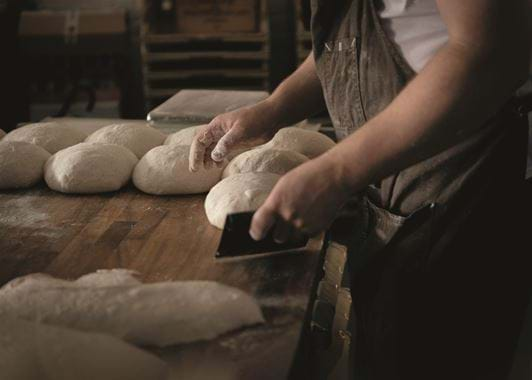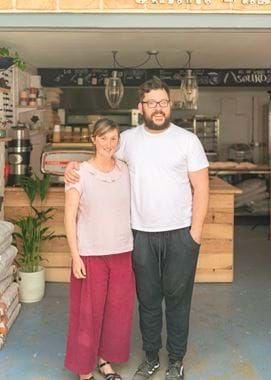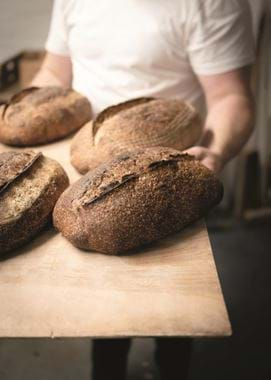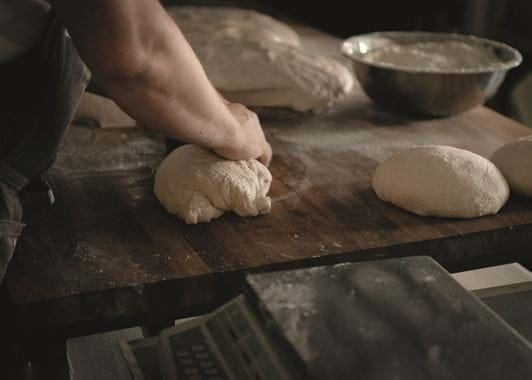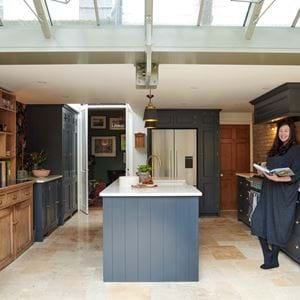Kneading time: the rise of the artisan bakery
Kneading time: the rise of the artisan bakery
Home baking may have seen a rise in popularity, but there’s a new wave of artisanal bakeries at the forefront of the movement. Journalist Busola Evans explores one which prides itself on its time-honoured techniques.
Few aromas are more enticing than the delicious smell of a freshly baked loaf, so there’s a strong likelihood that, should you step into the artisanal bakery Grain & Hearth in the pretty Kent seaside town of Whitstable, you will quickly abandon any rush to leave. And that’s exactly how owners Adam Pagor and his wife, Carmen, would want it. The very foundation of their business, which started in their converted garage four years ago, is built on taking a slow and considered approach. And that certainly extends to how they bake their products, particularly their slow sourdough bread, a speciality for which Grain & Hearth is fast becoming best known.
Now two years old, the bakery has moved on from its humble beginnings and is based in a single-storey former workshop in the heart of Whitstable. Its pared-back scheme perfectly marries modernity with a sense of history. Split in two, the front features shelving for bread and a counter for mouthwatering pastries, alongside customer seating from where bakers at the rear can be watched at work.
The bakery may be young, but an old soul lies beneath. They stay true to the traditional way of making sourdough which eschews the use of yeast, often added to quicken the fermentation process. Instead, head baker Adam leaves his dough to ferment naturally for 24 to 48 hours. ‘A normal yeasting bread would take two to three hours from the first mix to the baking, so making sourdough the way I do is a lengthy process,’ he says. ‘But it allows the flavour to fully develop and makes the bread more digestible, so ultimately it tastes better and is healthier for you. It’s worth the wait.’ His baking patience seemingly knows no bounds – croissants, for instance, are painstakingly made over three days. ‘I’m obsessive about the symmetry of the layering,’ he admits. What’s more, all the ingredients are sourced as local and organic as possible.
Adam’s baking passion stems from childhood. ‘My parents are Polish and there’s still a strong tradition of sourdough bread in Poland. It’s the bread I grew up with.’ Before moving to Whitstable, Adam and Carmen lived in London where he was a music librarian and she worked for the NHS. The obsession began after a one-day baking course, and a business was born. Today, the couple employ 14 people including five bakers, and each loaf is still moulded by hand. ‘You can’t replicate how we make things with a machine and we wouldn’t want to,’ explains Adam.
Future plans? ‘I want to do more slow-fermented food. These techniques yield the best results in terms of quality and flavour. I’ll always be hands on because I love the process and the pleasure people get from eating what we make.’
Five great bakeries around the UK
Bertinet Bakery, Bath | Using traditional methods, this bakery is renowned for its crusty, artisanal sourdough. The French-born owner, Richard Bertinet, has been teaching baking for over 20 years. Bertinet also supply our Bath café, The Provenist, with breads and pastries.
Baker & Graze, Cheltenham | This award-winning bakery embraces a combination of classic French techniques and modern Middle Eastern flavours. As well as sourdough bread and baked treats, it also offers brunch and lunch.
The Old Post Office Bakery, Clapham | The oldest organic bakery in London, it produces speciality breads, a pastry range including cheese and spelt croissants, and freshly-baked cakes.
Nova Bakehouse, Leeds | The store’s founder, Sarah Lemanski, won best baker in the 2014 Young British Foodie Awards, and is known to push the envelope. Expect traditional offerings alongside innovative delights.
Hoxton Bakehouse, Winchester | Set up in 2013 by husband-and-wife duo Florence Hellier and Darren Bland, Hoxton Bakehouse is particularly known for its addictive signature cinnamon buns – it sells 3,000 every week.
This article was first published in Stories, our lifestyle and interiors anthology. You can order or download the latest volume to read here.

